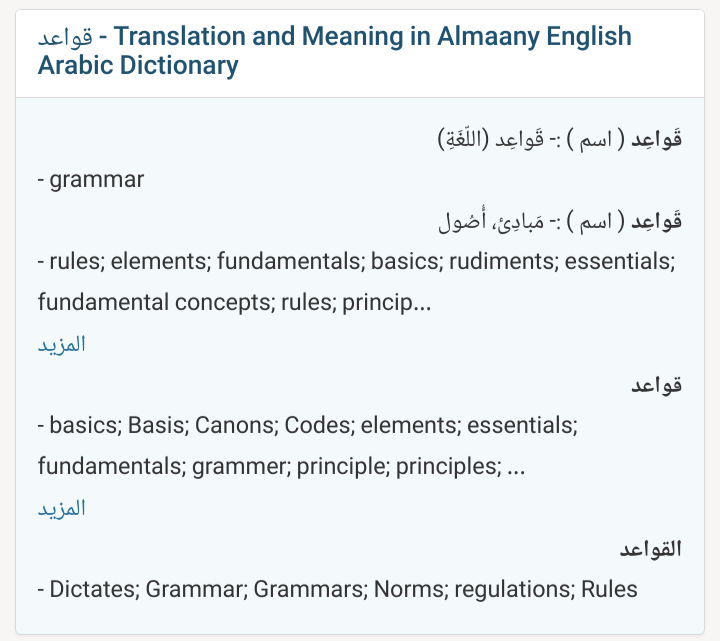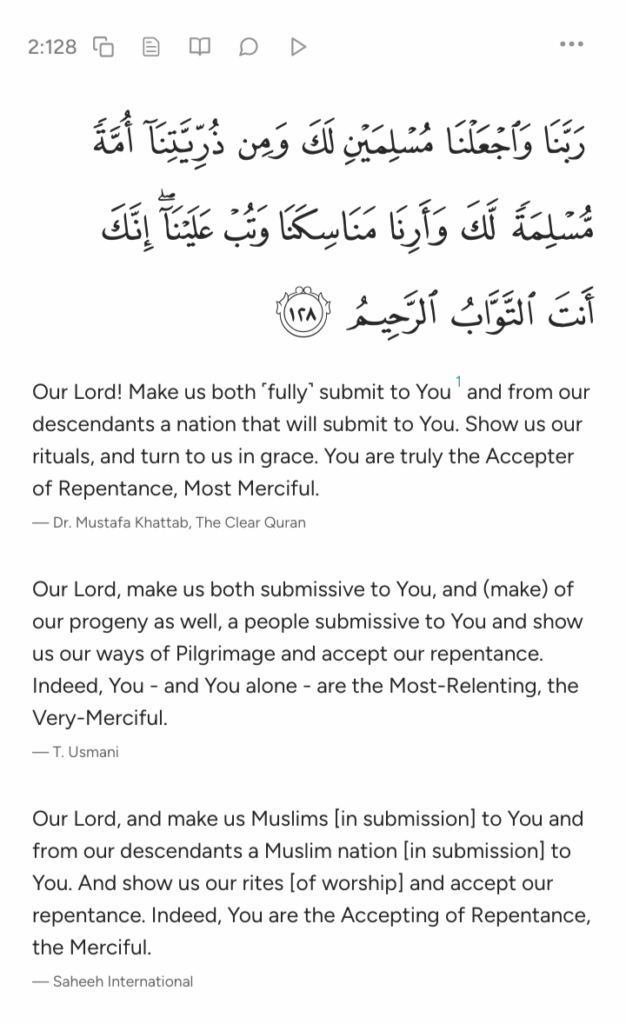Ṣalah means communication, Ṣalah is not the prayer, the prayer which is a bunch of ritual movements facing a cube, Yuṣalli can’t mean “He prays”, because Allah and His angels also do Yuṣalli on the believers, it would mean Allah and His angels performed a bunch of ritual movements facing the cube, this can’t be correct, it would actually mean communicates, and communicate as the conceptual root meaning would fit throughout the full Qur’an where all the taṣrīf forms of Ṣalah are used, such as the verse about Mushrikeen whistling and clapping that is their Ṣalah i.e. communicate, as in that’s how they communicate, for the Christians now it’s using bells to communicate, bells in schools, bells in the church, bells are used to tell workers/students to stop what they’re doing and take a break, it’s their communication method, they don’t use their tongue to do that, now it’s a notification bell on your phone. Anyway, Ṣalah would be communication, communication would be the antonym to tawalla which means to turn away, tawalla can be in a positive context, such as to turn away, turn away from communicating in a discussion or a debate with someone bad, turning away from bātil “Ṣalah” communication with disbelievers who will not find reason, meanwhile Allah and His Angels communicate to the believers, and the Qur’an fills that communication, fills the blanks.
قرءان سورة البقرة 2:124
وَإِذِ ٱبْتَلَىٰٓ إِبْرَٰهِـۧمَ رَبُّهُۥ بِكَلِمَـٰتٍ فَأَتَمَّهُنَّ قَالَ إنى جاعِلُكَ لِلنَّاسِ إِمَامًا قَالَ وَمِن ذُرِّيَّتِى قَالَ لَا يَنَالُ عَهْدِى ٱلظَّـٰلِمِينَ
• Saheeh International
And [mention, O Muhammad], when Abraham was tried by his Lord with commands and he fulfilled them. [Allah] said, “Indeed, I will make you a leader for the people.” [Abraham] said, “And of my descendants?” [Allah] said, “My covenant does not include the wrongdoers.” (Qur’an 2:124)
In this verse, Allah promised that he will make Ibrahim the leader of all mankind, and then it seemingly skips to mention Ibrahīm’s gratitude and praise to Allah for promising to make him the leader, and potentially the feeling of lack of worthiness which is conclusively negated by this promise, and instead shows Ibrahīm responding with the question regarding his progeny, though that is simply something to be understood from this verse without it being mentioned explicitly, so it’s implicit. And then Allah responds with the fact that his promise does not include the wrongdoers, implying the wrongdoers from his progeny won’t be leaders appointed by Allah, rather than giving a response of approval for progenies who were made leaders, the approval to Ibrahīm for some of his progeny being made leaders is a tacit approval and promise, and instead mentions that the wrongdoers won’t be part of this promise implying that there will be wrongdoers amongst his progeny so not all of them will be part of this approved promise of leadership to negate the false belief that all the descendants of Ibrahīm are bestowed with entitlement and sovereignty including the wrongdoers, so it’s a tacit implication, that is to be understood from the context of the verse without it being mentioned.
قرءان سورة البقرة 2:125
وَإِذْ جَعَلْنَا ٱلْبَيْتَ مَثَابَةً لِّلنَّاسِ وَأَمْنًا وَٱتَّخِذُوا۟ مِن مَّقامِ إِبْرَٰهِـۧمَ مُصَلًّى وَعَهِدْنَآ إِلَىٰ إبرهـۧمَ وَإِسْمَـٰعِيلَ أَن طَهِّرَا بَيْتى لِلطّآئِفِينَ وَٱلْعَـٰكِفِينَ وَٱلرُّكَّعِ ٱلسّجُودِ
• Saheeh International
And [mention] when We made the House a place of return for the people and [a place of] security. And take, [O believers], from the standing place of Abraham a place of prayer. And We charged Abraham and Ishmael, [saying], “Purify My House for those who perform Tawaf and those who are staying [there] for worship and those who bow and prostrate [in prayer].” (Qur’an 2:125)
The word used in this verse for “place of prayer” is Muṣallan which should place of communication, where they gather to communicate and exchange knowledge, at the Bayt Allah.
The word Tawaf here means circulate, not circumambulation, as that means to walk around something in circles, that’s not what it says, walk isn’t mentioned, what it means by Tawaf is that they circulate it as in they live around it, and of course, it’s located between Aṣ-Ṣafā and Al-Marwah, they live (spend their life) around the Bayt or they travel about it (journey) between the Aṣ-Ṣafā and Al-Marwah, not Pyro circuits like how pagans do around a fire.
قرءان سورة البقرة 2:126
وَإِذْ قَالَ إِبْرَٰهِـۧمُ رَبِّ ٱجْعَلْ هَـٰذَا بَلَدًا ءَامِنًا وَٱرْزُقْ أَهْلَهُۥ مِنَ ٱلثَّمَرَٰتِ مَنْ ءَامَنَ مِنْهُم بِٱللَّـهِ وَٱلْيَوْمِ ٱلْـَٔاخِرِ قَالَ وَمَن كَفَرَ فَأُمَتِّعُهُۥ قَلِيلًا ثُمَّ أَضْطَرُّهُۥٓ إِلى عذابِ ٱلنَّارِ وَبِئْسَ ٱلْمَصِيرُ
• Saheeh International
And [mention] when Abraham said, “My Lord, make this a secure city and provide its people with fruits – whoever of them believes in Allah and the Last Day.” [Allah] said. “And whoever disbelieves – I will grant him enjoyment for a little; then I will force him to the punishment of the Fire, and wretched is the destination.” (Qur’an 2:126)
This is the next verse that uses same linguistic style as 2:124, because Ibrahīm requests Allah to make Bakkah a secure Balad (Land) with provisions for the believers, and Allah rather responds that he will give enjoyment for a little to the disbelievers and then put them in hell, which implies that they too will have some enjoyment and not just the believers, in this life, but no mention of the approval to Ibrahīm’s request, as it’s also a tacit approval, a request that has been approved with the evidence for that approval in 2:125 that says Allah has made it secure, so it’s something to be understood without requiring it to be mentioned in this verse, so this verse implies that yes Allah has made it secure and provides to the believers with fruits but also that the disbelievers too will be given enjoyment for a little yet still be sent to hell.
قرءان سورة البقرة 2:127
وَإِذْ يَرْفَعُ إِبْرَٰهِـۧمُ ٱلْقَوَاعِدَ مِنَ ٱلْبَيْتِ وَإِسْمَـٰعِيلُ رَبّنا تَقَبَّلْ مِنَّآ إِنَّكَ أَنتَ ٱلسَّمِيعُ ٱلْعَليمُ
• Saheeh International
And [mention] when Abraham was raising the foundations of the House and [with him] Ishmael, [saying], “Our Lord, accept [this] from us. Indeed You are the Hearing, the Knowing. (Qur’an 2:127)
The word used for “foundations” in this verse is ٱلْقَوَاعِدَ which is in the definitive form, “foundations” as a definition can fit, though we’d have to deduce what it means by “foundations”, what type of “foundations” it is referring to.
Urdu translation of the verse, Syed Abu Ali Maududi translated ٱلْقَوَاعِدَ as دیواریں which means “walls”.

Though, what does ٱلْقَوَاعِدَ in Arabic actually mean?”walls” or دیواریں is an incorrect translation. According to this it means rules/regulations:

https://www.almaany.com/en/dict/ar-en/%D9%82%D9%88%D8%A7%D8%B9%D8%AF/#google_vignette
So basically, Ibrahīm and Ismā‘īl raised the rules/regulations of the House. They’re basically “foundations” of the House, the “foundational” rules/regulations.
قرءان سورة البقرة 2:128
رَبَّنَا وَٱجْعَلْنَا مُسْلِمَيْنِ لَكَ وَمِن ذُرِّيَّتِنَآ أُمَّةً مُّسْلمة لك وَأَرِنَا مَنَاسِكَنَا وَتُبْ عَلَيْنَآ إِنكَ أَنتَ ٱلتَّوَّابُ ٱلرَّحِيمُ

Saheeh International has got “Muslims” in their translation, even though verse it doesn’t have the plural noun, the verse has active participle, basically a verb, Muslimayni is a verb, and what it means is submissive.
Why does it say “Pilgrimage” in the second translation, it doesn’t have “pilgrimage” in the actual verse, they have mistranslated Manāsik as “Pilgrimage”, it means rites, Saheeh International have interpolated the words “of worship” after rites, although the word “worship” is not in the verse, it’s manāsik which means rites.
Notice something in these translations. The translators have given themselves creative freedom to try to improve Allah’s words, by adding in their own and exaggerating some, due to their own hubris. The first translation has “truly” in the translation, where is the haqq word for “truly” in the verse? Nowhere. And also they have Ar-Raḥeem as “Most Merciful”, where is the word for “Most” for Arabic? Also, Ar-Raḥeem should just mean The Merciful.
In the second translation, same problem, they have got the words “you alone” in the translation, where are the words for those in the Arabic? Nowhere. They have interpolated these words themselves. At-Tawwab would just mean The Relenting, yet they have that as “Most Relenting”, and Ar-Raḥeem which means The Merciful instead as “Very-Merciful”. Saheeh International doesn’t have this specific issue.
An attempt made in improving Allah’s words in the translation of verse 9:104.
قرءان سورة التوبة 9:104
أَلَمْ يَعْلَمُوٓا۟ أَنَّ ٱللَّـهَ هُوَ يَقْبَلُ ٱلتَّوْبَةَ عَنْ عِبَادِهِۦ وَيَأْخُذُ ٱلصَّدَقَـٰتِ وَأَنَّ ٱللَّـهَ هُوَ ٱلتَّوَّابُ ٱلرَّحِيمُ
Hilali & Khan: Know they not that Allah accepts repentance from His slaves and takes the Sadaqat (alms, charities) and that Allah Alone is the One Who forgives and accepts repentance, Most Merciful?
Here the translate Hilali and Khan have translated Ar-Raḥeem as the “Most” Merciful, whilst it’s proper meaning is The Merciful, there is no Arabic word for “Most” in the actual verse.
In 9:105 they have translated عَـٰلِمِ ٱلْغَيْبِ as All-Knower of the Unseen, no Arabic word for “All” in the actual verse itself. They have done the same for عَلِيمٌ حَكِيمٌ in 9:106 inserting the word “all” twice, each for both words.